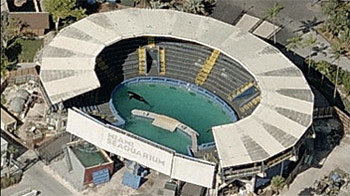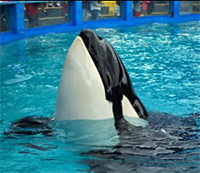Last Day for Public Comments to “Free Lolita”
Posted March 28, 2014 04:30 am (1 comment)

Lolita, confined since her capture in 1970 – a shot a
freedom.
MIAMI, FL - Lolita is a captive whale at the Miami Seaquarium who has been performing tricks for 43 years - and she could get a shot at retirement.
Today is the last day the U.S. Government takes public comments on the matter.
Lolita was captured off the Pacific coast of Washington in 1970 by the same methods shown in the documentary film "Blackfish."
 Howard Garrett, president of the board of the Orca
Network, says Lolita's family, including the orca many
believe to be her 83-year-old mother, are still alive.
Howard Garrett, president of the board of the Orca
Network, says Lolita's family, including the orca many
believe to be her 83-year-old mother, are still alive.
He says animal welfare groups have been working for
years to gain Lolita's release to her native waters.
"Lolita would be good candidate for a lot of reasons,"
Garrett says. "She's in good health - which is, you
know, amazing, startling, statistically that she has
survived this long, much less in good health - but also
because we know her family."
Links:
•
NOAA - Proposed Rule
•
Proposal to retire Lolita
•
Orca Network
The National Oceanic and Atmospheric Association (NOAA)
is accepting public comments about Lolita's release
until midnight Eastern at
regulations.gov.
The proposal would give her protected status along with
a list of endangered non-captive killer whales.
Miami Seaquarium says in a written statement, "It would
be irresponsible, reckless, and cruel to treat Lolita's
life as an experiment and jeopardize her health and
safety..."
But Garrett refutes that, as well as other claims that
Lolita should remain in captivity.
"They don't understand how orcas naturally live, and the
family that Lolita was taken from," he says. "They have
little to no experience - even watching orcas, much less
studying them and understanding their natural history."
Garrett says orcas are resilient, strong and adaptable.
He believes a plan to bring Lolita to a sea-pen close to
her family off the Washington coast will prove
successful, and predicts Lolita's relatives will welcome
her back into the pod.
He explains orca families still use the same language,
despite being apart for decades.
Naomi Rose is a marine mammal scientist with the Animal
Welfare Institute in Washington, D.C. Her concerns
include Lolita's tank being too small for her, which
Rose says is a violation of the Animal Welfare Act.
"So, when she's hanging in the middle of her tank, her
nose and her tail almost touch each side of her tank,"
Rose says. "When she hangs vertically in the tank, her
tail touches the bottom.
"She is in a facility where she cannot perform almost
any natural behaviors."
Miami Seaquarium states it has always adhered to federal
regulations regarding Lolita.
Rose counters that it's the smallest orca enclosure in
the country, and says it's time to let Lolita retire.
Photos/graphics, layout added by the Observer
Photo:
Orca Network
